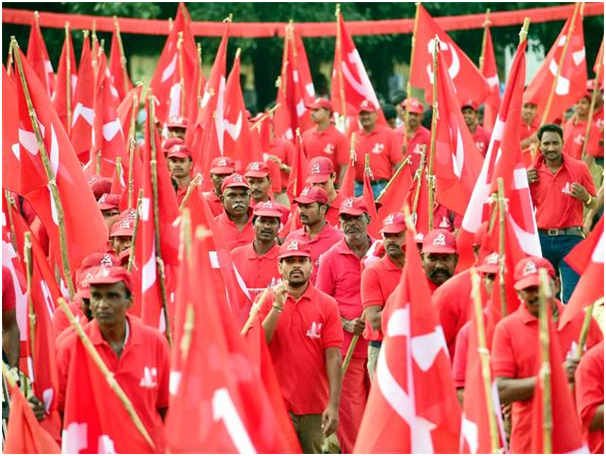Has Marxism Failed?
CPI(M) Plenum

In the recently held plenum of the CPI(M), resolution was passed to Observe the Centenary Year of the Great October Socialist Revolution” starting 16th November 2016.
Plenum of the Central Committee of Communist Party is an important forum to deliberate on Ideological issues in light of new lessons distilled out of practice. If this understanding is correct, then the fact that the last plenum was held a good 37 years back is quite intriguing for an ideology driven party. Particularly when total collapse has been witnessed in (former) Soviet society, which it idolised for almost three quarters of the last century. More so when the Global left fraternity is caught in intense intellectual fervent about why this debacle and what is the learning from it.
The Draft Resolution reminds the readers that the October Revolution had resoundingly vindicated Marxism-Leninism. The draft further acknowledges essence of Marxism-Leninism as the 'concrete analysis of the concrete conditions'. In reality, neither the draft nor any other party document reflects party’s analysis of the failure of the Soviet project leave alone conclusions or plans for re-organisation that will help the party transform its learning into practice. The “business as usual” attitude has left the party members clueless about the big picture, resulting in politics of reaction and tailism after mainstream parties. Equally important is serious erosion of pool of sympathisers who interpreted the events in their own way and parted ways with the belief system.
Today, there is volumes of literature available on the entire revolutionary period of 1917 and before, the Stalin era and the period from Khrushev to Gorbashev. This rich source of literature is replete with insights because of access to secret archives, penetrative studies by western scholars with cultural and language familiarity and first hand experiences of number of apologist insiders who once enjoyed critical positions in the soviet monolith.
What is most important is that the large part of this resource is honest intellectual investigation reasonably free of underlying biases or hidden propaganda. But it seems the left in India is unaware or reluctant to mull over this wealth of analysis.
And hence the seriously unpalatable part of this draft resolution, its sweeping eulogy of the “indispensable role of the vanguard Party” and the “principles of democratic centralism”
It is a well-documented fact that, since the second half of the 19th century, the process of gentrification of Russian society resulted in the emergence of a westernised class of intellectuals who had contempt for Russian peasantry. They discussed and debated various contending ideas including the Communist Manifesto in a clandestine manner in secret clubs (in Russian Kruzhki). This intellectual fervour was behind close doors and detached from the major part of Russian society. The noblemen, Intellectuals and middle class members were influenced by the French Revolution and their secret clubs were inspired by the Jacobins of French Revolution.
Leonard Schapiro a British academic and scholar of Russian politics has stated in his book that the architect of Russian revolution V I Lenin was immensely influenced by the Russian Ideologue P N Tkachev who was the first Russian to promote the idea of revolution by a small conspiratorial body of professionals acting in the name of people. Several other scholars like Alan Moorhead (The Russian Revolution) John S. Reshetar (History of the communist Part of Soviet Union) have endorsed that microcosm of Lenin’s idea of Democratic Centralism was in the early conception of Tkashev’s ideas. This makes one thing clear. No wonder, Lenin conceived Vanguard party and Democratic Centralism as the strategies in a historically specific context on the basis of his understanding of the specific material condition then existed in Imperial Russia. Bundling it with Marxism as science of social change and attaching universal validity to an untested idea is far from scientific to say the least.
In fact the “concrete analysis of the concrete conditions” of the Soviet project warrants outright rejection of this these. Because in my humble opinion, Soviet experiment this was the root cause for emergence of an elite class of self seeking party bureaucrats and the total alienation of the class for whom it was to usher in material and spiritual betterment. This is not a place for producing a dense philosophical critique. Nor do I consider myself eligible to author it. But certainly needs urgent attention of the party stalwarts in CPI(M).
No sane mind will write off the Russian revolution as a total failure and may be, Marxism is a failed project. It not only created a society with much better material conditions for everyone but also ensured primacy to egalitarian and human values on global level. A mammoth and permanently irretrievable change. And for this reason alone, the centenary celebration is well-deserved proposition and it will get its due recognition if the entire humanity participates in this celebration may be through United Nation.
All that I have said so far is out of pain and agony of living life in the world devoid of a dominant progressive, pro poor ideology. Times when mann ki baat is the profound intellectual discourse, chewed over by the populace the day after during office tea breaks. Why can’t my fellow travellers confront the elephant in the room and regain intellectual leadership of our society. What do they achieve by this collective amnesia ? Don’t they know the wise man’s words “Believe those who are seeking the truth, doubt those who have already found it”



